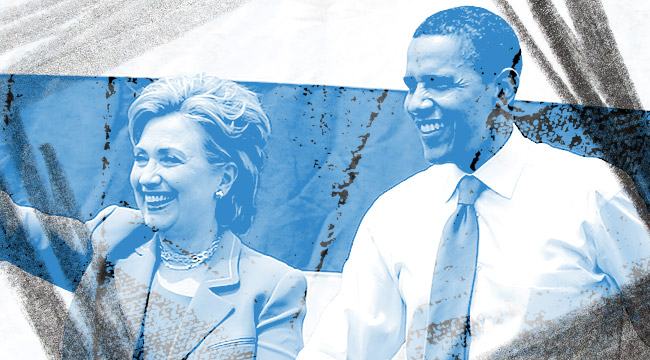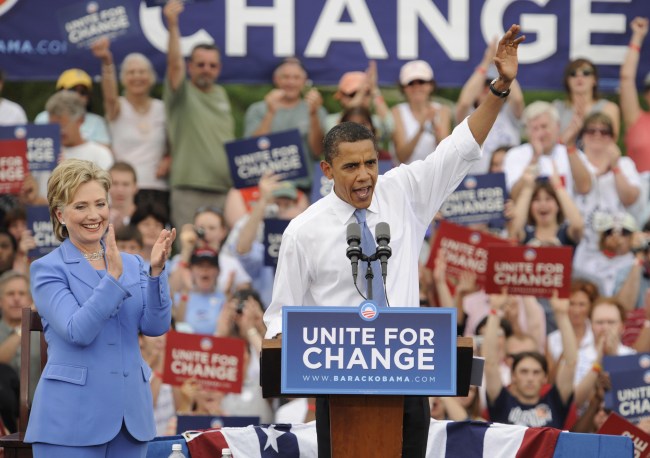
Eight years ago, Barack Obama defeated Hillary Clinton in a tight primary race. What followed was a somewhat contentious working relationship and years of awkwardness, which presumably ended in unity. On Thursday, Obama formally endorsed Clinton just days after she crossed the delegate threshold and declared herself the presumptive Democratic nominee. Some enterprising social media detectives even figured out when he recorded his endorsement video, in which he said, “I don’t think there’s ever been someone so qualified to hold this office.” He did so on Tuesday — after the delegate announcement, but before Clinton effectively ended Bernie Sanders on the final Super Tuesday. The Bern’s still sticking around despite Obama dropping his announcement just after their White House meeting. And the reason for that burn timing will be a mystery for the political ages.
However, Obama and Clinton’s ups and downs played out in a much more public way. They’ve been rivals, co-workers, and allies. Clinton spent much of her campaign scratching his back, and he’s returned the favor. Sure, she occasionally slips off script, which may have been why she hinted at Bill Clinton’s future role in “revitalizing the economy.” Some people interpreted that as Hillary judging Obama’s not-so-great economy. But mostly, these two enjoy a very workable relationship now. The fury of their former rivalry has long been extinguished, and they’ve settled into a figurative old-married-couple level of comfort. Or so they want us to believe. Exactly how well do Obama and Clinton get along, and is this a strategic endorsement that shall benefit both parties? To find out, we need to travel back in time to the 2008 Democratic primary battle.
An Exhausting Primary Rivalry
Political memories can be short these days, especially because the current political race is so contentious and fiery. But Clinton did her fair share of sparring with Obama back in the day. During their heated 2008 primary debates, the two Democrats slung plenty of dirt, which culminated with Obama famously dissing Clinton for being a “corporate lawyer sitting on the board at Wal-Mart” while he watched jobs being sent overseas.
In another debate moment that shall live on in infamy, Obama paused during a discussion about Clinton’s likability factor before casually admitting, “You’re likeable enough.” This backhanded compliment was greeted with a peppy head shake from Clinton, and just think about how much her oratory style has changed since then.
After Obama became the official party nominee, Clinton quickly fell in line for the cause of party unity. She graciously endorsed him and was rewarded with a cabinet position, but it wasn’t all roses from there.

“A Team Of Rivals” Comes Together
Obama famously built a “team of rivals” for his administration. He chose two former primary competitors — Clinton as Secretary of State and Joe Biden as Vice President — to work closely beside him. Clinton decided not to stick it out for two full terms, and her tenure has seen long-lasting consequences that inspire plenty of debate. Her use of a private email server, for example, drastically affects her trustworthiness in the eyes of some voters. This discussion doesn’t even touch the Benghazi scandal, but it’s worth mentioning how Sanders hammered Clinton for her interventionist ways, which he said created a “political vacuum” that gave birth to ISIS. Indeed, Sanders held Clinton responsible for what happened after the U.S. overthrew Libyan dictator Muammar Gaddafi while she was Secretary of State.
However one feels about Clinton’s actions, she took them all as part of Obama’s administration. In this way, any association with him will be long lasting. This could be part of why Obama waited to endorse Clinton until she had the nomination sewn up. However, this could also account for why she directly blamed Obama in April for what’s gone down in Libya and Syria:
“The decision was the president’s. Did I do the due diligence? Did I talk to everybody I could talk to? Did I visit every capitol and then report back to the president? Yes, I did. That’s what a secretary of state does. But at the end of the day, those are the decisions that are made by the president to in any way use American military power, and the president made that decision and, yes, we did try without success because of the Libyans’ obstruction to our efforts, but we did try and we will continue to try to help the Libyan people.”
This was one hell of a bold move on Clinton’s part, and her response perfectly illustrates the ways she’s been hindered a bit by her Obama association. She may have been equally or more responsible than him for the above decision, but her pushback indicates a great amount of friction that went on behind the scenes of the “no drama Obama” administration. There’s still a hint of rivalry, even if they’ve found outward peace together now.
Muting The Past And Achieving Unity
Obama waited until a crucial moment to reveal his endorsement, but he forecast his decision in January. At that time, Obama sat down with Politico to discuss the current election. He expressed his concerns at how Sanders seemed like a shiny new object to Democrats, which easily made him more appealing to voters who want something different. Obama worried that his own tenure would cast a disadvantageous light upon Clinton since they worked together so closely. He described this tie (along with her frontrunner status) as “both [a] privilege and burden,” and then he got down to business:
“Look, I’ve gotten to know Hillary really well, and she is a good, smart, tough person who cares deeply about this country, and she has been in the public eye for a long time and in a culture in which new is always better. And, you know, you’re always looking at the bright, shiny object that people don’t, haven’t seen before. That’s a disadvantage to her. Bernie is somebody who — although I don’t know as well because he wasn’t, obviously, in my administration, has the virtue of saying exactly what he believes, and great authenticity, great passion, and is fearless. His attitude is, ‘I got nothing to lose.'”
These words forecast Obama’s eventual full-on support of Clinton. He did offer some praise to Sanders, but he also discounted him as a mere diversion for the American people. And Obama’s savvy enough to know that people will remember his rivalry with Clinton and their not-always-smooth working relationship. So, he prepared voters a bit as primary season heated up, and he waited until Clinton had accomplished her primary goals, so as not to discount her election efforts. That shows not only restraint, but respect.
Obama’s approach to holding his endorsement shows his belief that Clinton could hold her own against any Democratic candidate. Now that she will officially go up against the enemy, Obama stands with her in symbolic unity. Now, is this perceived unity or the real deal? That doesn’t matter, especially in an election that closely (thanks to Trump) resembles show business. Surely, Obama would also like Clinton to continue his legacy in some form. The Democrats may not be united now — and with Sanders contesting the convention, it won’t happen for awhile — but if Obama and Clinton can put aside their past rivalry and get along, anything could happen.
